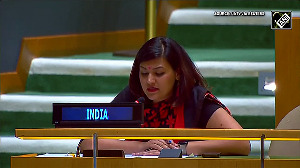Senator Richard Lugar, the chairman of the powerful Senate Foreign Relations Committee has said that civilian nuclear cooperation between India and the United States will allow the US to engage in peaceful cooperation while safeguarding US national security and nonproliferation efforts, as well as Congressional prerogatives.
Both the House and Senate are set to approve the enabling resolution to the Indo-US civilian nuclear bill and send it to the president's desk.
The Republican lawmaker from Indiana, who co-authored the Senate bill with the ranking Democrat on the Committee, Senator Joe Biden of Delaware, said: "The deal is an opportunity to build a vital strategic partnership with a nation that shares our democratic values and will exert increasing influence on the world stage."
Earlier, the ranking Democrat on the House International Relations Committee, US Representative Tom Lantos, who co-authored the House bill with the chairman of the Committee, US Representative Henry Hyde, Illinois Republican, said, after he signed off on the conference report that, 'This latest step in a long and sometimes arduous legislative process has resulted in a satisfying consensus.'
Lantos said it is in the interest of both the US and India to strengthen ties and nurture the nascent partnership between our two great countries. "We now have the opportunity to achieve a geo-strategic re-alignment of India with the United States," he said.
"This will be of immense importance to global security and economic development, while at the same time furthering our interests in limited the spread of nuclear weapons," he said.
Lantos said the conference report agreement strikes the right balance between giving the president the necessary flexibility to negotiate the best agreement possible with New Delhi, while at the same time preserving Congressional oversight.
Lugar, Hyde, Biden and Lantos -- the latter two will soon take over as chairs of Senate Foreign Relations Committee and the House International Relations Committee respectively -- said in a joint statement that HR 5682 (the House-Senate compromise enabling legislation) 'reflects the widely held view in both the House and Senate that peaceful nuclear cooperation with India can serve multiple US foreign policy and national security objectives, but that this must be secured in a manner that minimises potential risks to the global nonproliferation regime.'
The protagonists behind the legislation, who were the managers of the House-Senate Conference on the bill, declared, 'Among the most important considerations are ensuring that Nuclear Suppliers Group guidelines and consensus decision-making are upheld and that a US nuclear cooperation agreement and subsequent US nuclear exports are consistent with the decisions, policies, and guidelines of the NSG.'





